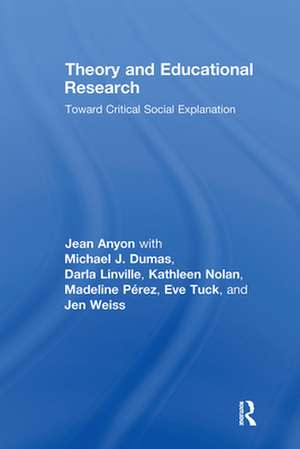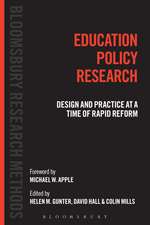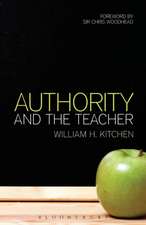Theory and Educational Research: Critical Youth Studies
Autor Jean Anyonen Limba Engleză Paperback – 6 aug 2008
Each chapter models a theoretically informed empiricism that places the data research yields in constant conversation with theoretical arsenals of powerful concepts. Personal reflections following each chapter chronicle the contributors’ trajectories of struggle and triumph utilizing theory and its powers in research. In the end this rich collection teaches education scholars how to deliberately engage with critical social theory in research to produce work that is simultaneously theoretically inspired, politically engaged, and empirically evocative.
| Toate formatele și edițiile | Preț | Express |
|---|---|---|
| Paperback (1) | 382.68 lei 6-8 săpt. | |
| Routledge – 6 aug 2008 | 382.68 lei 6-8 săpt. | |
| Hardback (1) | 1271.75 lei 6-8 săpt. | |
| Taylor & Francis – 14 iul 2008 | 1271.75 lei 6-8 săpt. |
Preț: 382.68 lei
Nou
Puncte Express: 574
Preț estimativ în valută:
73.24€ • 75.48$ • 61.84£
73.24€ • 75.48$ • 61.84£
Carte tipărită la comandă
Livrare economică 04-18 martie
Preluare comenzi: 021 569.72.76
Specificații
ISBN-13: 9780415990424
ISBN-10: 0415990424
Pagini: 206
Ilustrații: 1 black & white tables
Dimensiuni: 150 x 221 x 13 mm
Greutate: 0.3 kg
Ediția:1
Editura: Routledge
Seria Critical Youth Studies
ISBN-10: 0415990424
Pagini: 206
Ilustrații: 1 black & white tables
Dimensiuni: 150 x 221 x 13 mm
Greutate: 0.3 kg
Ediția:1
Editura: Routledge
Seria Critical Youth Studies
Cuprins
Introduction: Critical Social Theory, Educational Research, and Intellectual Agency, Jean Anyon
Part I ߝ Theory and Explanatory Analysis
1. Critical Social Theory and the Study of Urban School Discipline: The Culture of Control in a Bronx High School, Kathleen Nolan
Personal Reflection
2. Theorizing Student Poetry as Resistance to School-based Surveillance: Not Any Theory Will Do, Jen Weiss
Personal Reflection
3. Theorizing Redistribution and Recognition in Urban Educational Research: ‘How Do We Get Dictionaries at Cleveland?’ Michael J. Dumas
Personal Reflection
Part II ߝ Theorizing with Research Participants
4. Theorizing Back: An Approach to Participatory Policy Analysis, Eve Tuck
Personal Reflection
5. Low-income Latina Parents, School Choice, and Pierre Bourdieu, Madeline Perez
Personal Reflection
6. Queer Theory and Teen Sexuality: Unclear Lines, Darla Linville
Personal Reflection
Epilogue, Michelle Fine
Part I ߝ Theory and Explanatory Analysis
1. Critical Social Theory and the Study of Urban School Discipline: The Culture of Control in a Bronx High School, Kathleen Nolan
Personal Reflection
2. Theorizing Student Poetry as Resistance to School-based Surveillance: Not Any Theory Will Do, Jen Weiss
Personal Reflection
3. Theorizing Redistribution and Recognition in Urban Educational Research: ‘How Do We Get Dictionaries at Cleveland?’ Michael J. Dumas
Personal Reflection
Part II ߝ Theorizing with Research Participants
4. Theorizing Back: An Approach to Participatory Policy Analysis, Eve Tuck
Personal Reflection
5. Low-income Latina Parents, School Choice, and Pierre Bourdieu, Madeline Perez
Personal Reflection
6. Queer Theory and Teen Sexuality: Unclear Lines, Darla Linville
Personal Reflection
Epilogue, Michelle Fine
Recenzii
"This volume scrubs the mystique off social theories, making them accessible and even agreeable to a much wider audience, thus opening up immeasurable opportunities for future creative application. As instructor and students, we could not recommend this book more highly."--International Journal of Qualititative Studies in Education 2009
"This has been a valuable book for me, and I recommend it to anyone considering using social theory in their research, particularly doctoral students."--Joseph A. Maxwell, Education Review, January 2010
"This has been a valuable book for me, and I recommend it to anyone considering using social theory in their research, particularly doctoral students."--Joseph A. Maxwell, Education Review, January 2010
Notă biografică
Jean Anyon is Professor of Social and Educational Policy in the Urban Education Doctoral Program at The Graduate Center of the City University of New York.
Descriere
Descriere de la o altă ediție sau format:
Throughout U.S. history, education policies, practices, and politics have been described and tested to yield empirical data, often with little attempt to place findings in a larger theoretical infrastructure that could provide them with increased explanatory, critical, or even liberatory power. This collection fills that void by taking the point of view that neither research nor theory alone is adequate to the task of social explanation. Instead, Jean Anyon and her collaborators argue that they imbricate and instantiate one another, forming and informing each other as the inquiry process unfolds.
Throughout U.S. history, education policies, practices, and politics have been described and tested to yield empirical data, often with little attempt to place findings in a larger theoretical infrastructure that could provide them with increased explanatory, critical, or even liberatory power. This collection fills that void by taking the point of view that neither research nor theory alone is adequate to the task of social explanation. Instead, Jean Anyon and her collaborators argue that they imbricate and instantiate one another, forming and informing each other as the inquiry process unfolds.


































